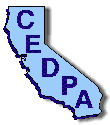 |
California Educational Data Processing Association
|
The DataBus - Vol. 36, No. 5
August-September, 1996
|
>
Educational Technology Legislative Update
John Cradler, WestEd
$750 Approved for New Education Initiatives with Technology as a High Priority.
On July 15, Governor Pete Wilson signed the 1996-97 state budget, leaving intact virtually every K-12 education item approved by the Legislature. The following is a summary of the major education technology funds approved by the Governor and the Legislature.
- New School District Block Grants: (one-time funds) ** $200 million (about $35 per average daily attendance) was approved for education technology, instructional materials, library resources, deferred maintenance, or any other non-recurring costs. Prior to the use of these funds, local school boards must hold at least one public hearing to identify the needs and existing resources available to justify the funding.
- School-Site Block Grants: (one-time funds) ** $387 million (about $72 per average daily attendance) was approved for individual school site block grants. No school shall receive less than $25,000, which may be spent according to priorities determined by local school councils or advisory groups. School boards must approve spending plans prior to allocation of funds.
- Reading Initiative: ** $167 million was approved for the Governor's reading initiative. These funds will be used for additional instructional materials and staff development. Technology-based resources supporting reading instruction may also be included.
$100 Million Technology Fund Rejected.
The $100 million for an Educational Technology Block Grant and $83.4 million for an increase in the State Instructional Materials Fund was not approved. The Legislature decided to delete these separate line items and lump the funds into school district and school site block grants to allow maximum local flexibility.
$35 million available Fall '96.
Approximately $35 million has been approved by the courts and the PUC for distribution to California public schools to support connectivity and Internet access. The Office of Public School Construction (OPSC) will administer this fund in conjunction with the CDE. OPSC is presently developing guidelines for distribution of the funds on an equitable basis to all schools sometime in the Fall.
Update on the $10 million for re-furbished computers. The Governor approved $10 million for California Computer Refurbishing Fund, the Detweiler program to refurbish recycled computers. The State awarded $150,000 to Sacramento County Office of Education to administer this project. A policy advisory committee is being formed to develop standards and guidelines for refurbishing and distributing computers. Schools can apply for refurbished computers sometime in the Fall. The CDE reported that these computers, at a minimum, should have the capacity for Internet and other high-end uses.
Update on the Technology use and home-school communications infrastructure.
SB 1802 (Polanco) was intended to authorize implementation of the Technology Task Force Report recommendations. However, it was determined that more time is needed to advocate for the recommendations and to put this bill on hold until next year.
Lottery Bond Bill Passed.
AB 536 (Archie-Hudson) to enact the Archie-Hudson and Cunneen School Technology Revenue Bond Act, was passed and chaptered into law. It allows for the issuance of bonds that could be re-paid with up to 25% of the lottery funds collected for that year.
Categorical programs funding reform passed.
AB 2769 (Baldwin) consolidates 27 existing categorical programs. The bill goes into effect for fiscal year 1997-98. This would eliminate the current SB 1510 School Based Educational Technology Grants Program as these funds would be consolidated with the other 26 programs and allocated to schools on a per-pupil formula. While this bill has passed the Assembly, it may have difficulty passing the Senate.
Superintendent's Educational Technology Task Force Report Released on July 10th.
The Superintendent's Technology Task Force released its report on July 10, 1996. The report makes the following recommendations:
- Equip every California classroom and school library with the technology resources needed to create a learning environment that will improve student achievement.
- Incorporate technology into student content and performance standards recommended by the state for adoption at the district level.
- Integrate technology into the content and performance standards that will be used as the basis for setting policies for preparing, hiring, evaluating, and promoting teachers.
- Provide the expertise and resources to support the effective use of technology for students, teachers, parents, and the broader community.
The report provides cost information suggesting a price tag of over $10 billion to provide the technology access and support needed for teachers to implement the goals of the report. Presently the Task Force is working with groups such as the California Business Roundtable in an effort to obtain bipartisan support for funding this plan.
A National Partnership to Train Teachers.
President Clinton announced a new initiative, 21st Century Teachers, a volunteer corps to help all teachers learn how to use new technologies to improve teaching and learning in every school, classroom, and home. In an effort to help meet the President's challenge that all teachers will be trained in the use of educational technologies, the corps has pledged to:
- recruit 100,000 teachers already familiar with technology to lead an Internet kick-off event (similar to California NetDay) as school begins this fall to introduce their colleagues to the potential of educational technology.
- train more than 500,000 other teachers beginning in October and continuing throughout the school year in using computers, educational software, and the Internet.
Parents, school boards, business groups, colleges and universities have volunteered to provide new resources and support to help technologically literate teachers help other teachers use new and more powerful learning tools.
Originally published as WestEd Educational Technology Legislative Update, July-August edition. Reproduced by permission of WestEd.
John Cradler is Legislative Policy Specialist for WestEd. He may be reached by e-mail at [email protected].
 Return to August-September index
Return to August-September index

